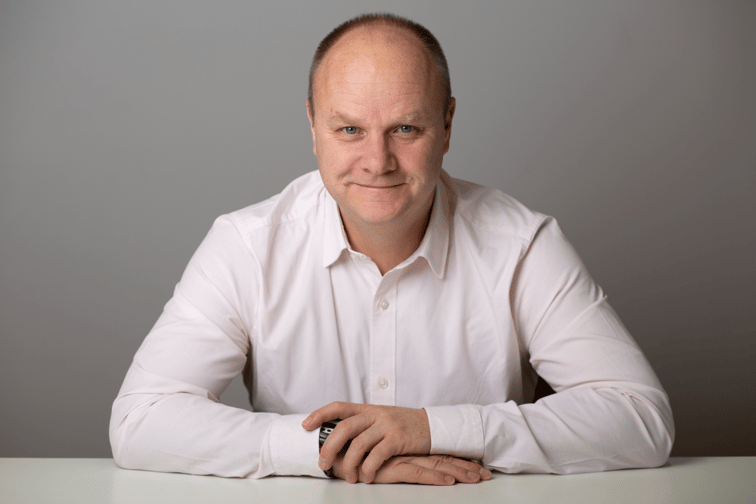

The early “kitchen table” discussions of any fledgling business will see co-founders mulling over everything from branding to strategy to market outlook to timing. The hallmark of most successful businesses, however, is that no matter how many changes to the above, the ethos at the heart of the business remains clear.
During those early conversations, the founder of health MGA Equipsme hadn’t yet decided on its name, noted co-founder and CEO Matthew Reed (pictured) but there was no doubt in their minds as to its purpose – to allow smaller businesses to do more for their workforces. As it turned out, he said, that commitment to equipping firms with the tools needed to survive and thrive no matter the market conditions, lent in turn to its name.
“Equipsme came about as a result of us looking at the health insurance market and finding it old, stagnant and complacent,” he said. “Having been an insurer myself, I can say that insurers tend only to innovate when something’s going wrong. Where there isn’t a loss ratio driving the need to do better, there’s not much innovation. And insurtech is changing that a bit but when you think of health insurance as a product, there’s very little to feasibly damage the loss ratio. Even the pandemic didn’t.”
When Equipsme launched in 2018, market research revealed that while 50% of small businesses in England had looked into health insurance, only 5% ended up buying it for their staff. When the team looked into why so many ended up walking away, the feedback was remarkably consistent. People were put off by price and complexity, explained Reed. As a result, it became an elite perk bought only for the staff who would be able to afford it for themselves anyway.
“Our idea was that we can do more and we can allow companies to do more for their people,” Reed said. “At the end of the day your people are your business. A bakery, for example, would rely on their van driver to get their orders out. You insure the vehicle so why wouldn’t you buy insurance to get the driver in front of a physiotherapist in two days if they hurt their knee?”
When Equipsme started it focused on the definition of SMEs – from two-to-249 people – but it very quickly expanded.
“We found that it wasn’t just small to medium sized businesses who wanted a simple, affordable and practical health insurance option. It was big businesses who wanted to expand health support to more or all of their workforce – and/or do rather more for them than a helpline and a cash plan. We now have businesses with staff in the 1000s - and a self-employed product as well.”
Working within that broad remit, Equipsme’s focus quickly centred on building a product that “didn’t need any explanation,” he said. The team felt strongly that insurance, and health insurance in particular, had become too jargon-heavy and so set about demystifying the product for the benefit of the average purchaser.
“We made our offering a non-advised product by the definition of the FCA because we felt that if you’re a business that is surviving and wants to look after your staff, you will be bright enough to understand this insurance product,” he said.
“For us, it’s about offering choice. I think something you’ve got to be very careful about with SMEs is assuming that they’re all going to buy insurance in the same way. We have people who want to buy direct, others who might buy it from their bank, and we have a lot of businesses who buy through their broker.”
Equipsme already works closely with the broker market, Reed said, as when the product was first launched, it was done so with the ambition of allowing general insurance brokers to offer something different to their clients. Consolidation has only made that objective more pertinent.
Looking across the market, he noted that the general consolidators are now snapping up health insurance brokers. And with that comes the opportunity – if not the necessity – for independent general insurance brokers to get involved with innovative, simple, non-specialist products which have significant market appeal.
“We didn't build this to be disintermediated at all,” he said. “We built it to allow non-medical specialist brokers to offer it to their customers. When you think about the general insurance broker, they’ve probably got two or three policies with their clients, and they’re the button that’s pushed when those clients wants insurance advice – whether it’s life insurance or medical insurance, or their general insurance needs.
A COVID-induced focus on health, a competitive job market and the ever-growing NHS waiting list are all fuelling new demand for business health insurance. Indeed, he said, a report published in December found that a fifth of employees on the 7.2 million person NHS waiting list have had to reduce their working hours while waiting for NHS treatment - and a further two fifths (40%) change the tasks they do.
“We’re seeing more customers now asking their brokers questions about affordable health insurance products,” Reed said. “And most brokers’ first waking thoughts these days are on how to keep the customers they have happy. So, we feel that if, as a general broker, you can respond to your clients’ requests for information or support around their medical insurance needs then that’s going to leave you in a much better position than having to say ‘sorry I don’t know’.”
What are your thoughts on this story? Feel free to share them in the comment box below.
